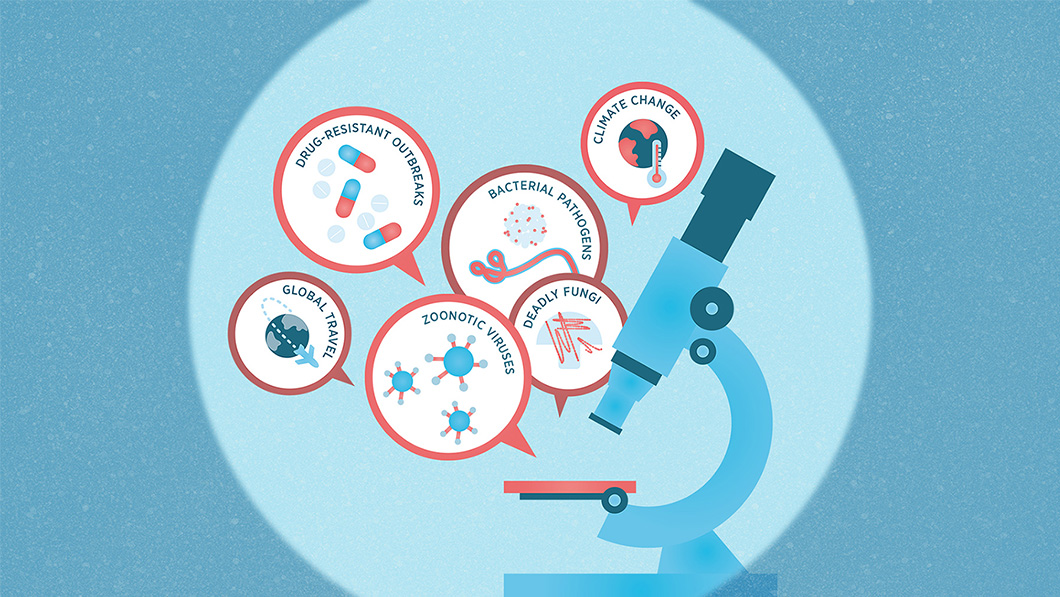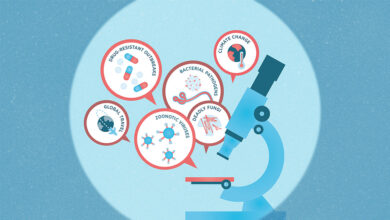
PPF Health Security: Social media lawsuits and Alaskapox
Sponsored by:

PPF’s report The Next One: Preparing Canada for Another Health Emergency outlines the lessons learned from the pandemic and how Canada can safeguard against future health emergencies. To keep the discussion going — and to keep Canadians informed – this newsletter looks at what’s happening in the world of health security each week.
Here’s what we’re following:
Cleaner air — for now
The U.S. Environmental Protection Agency has updated its national air quality standards in an attempt to reduce the level of particulate matter (PM) in the air. With the change, the annual standard for PM will drop from 12 micrograms per cubic metre of air to nine micrograms per cubic metre. The head of the EPA said that the change will create $46 billion in net health benefits by 2032, including the prevention of up to 800,000 asthma attacks and 4,500 premature deaths. The new rules would mean that counties and states must meet the standard or, in the case of a failure to comply, have 18 months to become compliant or face penalties. While the new standards don’t target specific industries, some were quick to denounce the changes, including paper industry associations.
But industry pollution isn’t the only air quality culprit. Recently, wildfires, including those that swept across Canada last summer and have recently devastated parts of Chile, are being accelerated by climate change — and have caused significant air quality issues.
The potential impact of climate change on air quality in the U.S. was modelled in a report from nonprofit First Street Foundation, released this week. It suggests that climate change will erase previous gains made via regulation in areas such as industrial pollutants and car exhaust. The report’s modelling indicates that about 10 percent of properties in the U.S. cope with a week or more of “unhealthy” air quality days every year due to fine particle pollution. If current trends continue, air quality in 2054 will be as bad as it was in 2004, “wiping away 20 years of air quality improvements.”
Health data breaches
The personal data of 33 million people in France (roughly half its population) was accessed during a hack on third-party health payment systems in January, the country’s National Commission on Informatics and Liberty (CNIL) revealed last week. Personal details such as dates of birth, marital status, and social insurance numbers were accessed. According to the companies involved — Viamedis and Almerys — personal contact details, as well as medical and banking information, weren’t compromised during the data breach. Still, CNIL cautioned that the data that was accessed could be combined with other data that may have been captured in earlier data leaks.
Meanwhile in Canada, some virtual health industry insiders are warning that virtual care providers may not be protecting patient data — and that it could be being used by drug companies or other third parties for commercial reasons. In some cases, de-identified personal health data could be shared with companies that amalgamate data from browsing history, social media, or other sources to target ads aligned to health concerns.
Undermining public trust around the handling of health data could be a major obstacle to much-needed reforms to Canadian health care.
Social media sued
Last week, New York City launched a lawsuit against the companies behind Instagram, TikTok, Snapchat and YouTube to recoup some of the costs it has incurred in caring for youth with mental health issues.
The city’s lawsuit says the platforms have caused “substantial interference with school district operation” and imposed “a large burden on cities, school districts and public hospital systems that provide mental health services to youth.” The lawsuit accuses the social media companies of promoting “disconnection, disassociation, and a legion of resulting mental and physical harms.”
The lawsuit isn’t the first of its kind launched against social media companies this year. In January, Education Week reported that more than 200 school districts in the U.S. have now sued social media companies, citing similar reasons as New York City: the school districts say they need to recoup costs associated with addressing youth mental health issues caused in part by the addictive platforms.
Last month, the heads of social media companies testified to a U.S. Senate committee that is investigating the harm platforms have caused American youth and what’s being done to further protect kids. The hearing included the parents of children who had been exploited on social media or had been lost to suicide. At one point, Meta CEO Mark Zuckerberg turned to those parents and offered an apology. “I’m sorry for everything you have all been through. No one should go through the things that your families have suffered,” he said. Moments earlier, one senator had asked Zuckerberg whether he’d ever personally compensated any family. “I don’t think so,” Zuckerberg said.
Alaskapox death
Alaska reported the first death from a rare virus known as Alaskapox. The virus was first discovered in 2015 and has since infected seven people, six of them in the Fairbanks area. Those cases mostly resulted in mild illnesses and no hospitalizations.
Alaskapox is carried by small wild mammals, but has also been found in pets. Health officials said that the man who died in late January was “an elderly man from the Kenai Peninsula with a history of drug-induced immunosuppression.” It is possible that scratches from a stray cat caused the infection.
Alaskapox causes lesions, much like smallpox. There are no reported cases of human-to-human spread, but Alaskans have been advised to cover lesions with a bandage.
‘Silent pandemic’
The European Centre for Disease Prevention and Control (ECDC) released a risk assessment about the “sustained spread” within health facilities of a hypervirulent K. pneumoniae (hvKp) that is resistant to last-resort antibiotics used to treat serious infections.
This so-called superbug was once primarily found in Asia and was only rarely resistant to antibiotics. “With the convergence of virulence and antimicrobial resistance in hvKp strains, there is a possibility of potentially untreatable infections in previously healthy adults,” stated the ECDC. Infections have recently jumped from 12 cases to 143.
In a news release accompanying the risk assessment, the ECDC warned that the spread in health-care settings “is expected to result in increased morbidity and mortality among vulnerable patient populations.”
The bacteria was first detected in Taiwan in the mid-1980s. Antimicrobial resistance has been dubbed ‘a silent pandemic’ and could lead to tens of millions of deaths by 2050, according to a report from Imperial College London.
Events:
February
- Feb. 21: Wall Street Journal Health Forum. Boston, Mass.
- Feb. 22: Future of Health Leadership, Informatics and Policy Conference. Toronto, Ont.
- Feb. 22-23: GENAP Summit 2024. Geneva, Switzerland.
- Feb. 25-28: ViVe 2024. Los Angeles, Calif.
March
- March 3-5: ACDM24. Copenhagen, Denmark.
- March 8-12: SXSW Health and MedTech Track 2024. Austin, Texas
- March 11-15: 2024 HIMSS Global Health Conference. Orlando, Fla.
- March 19-21: Rare Diseases Summit. Philadelphia, Pa.
- March 26-28: Precision Med TRI-CON. San Diego, Calif.
Did someone forward you this newsletter? Subscribe to PPF: Health Security newsletter
Related Articles



